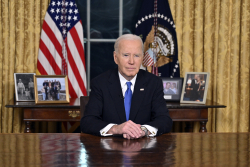After a leak contradicted Trump’s claims on Iran strikes, the White House may restrict congressional access to intelligence, sparking legal concerns, partisan backlash, and fears of politicized secrecy.
The Trump administration could significantly limit the sharing of classified information with Congress, a move that Democratic lawmakers quickly criticized. The White House said the move was necessary after a leaked assessment of its strike on Iran’s nuclear facilities contradicted President Donald Trump’s claim that they were obliterated. The leak occurred after the details prepared by the Defense Intelligence Agency (DIA) were shared with Congress via CAPNET, a system used in the sharing of classified intelligence.
“This isn’t about national security, it’s about Trump’s insecurity. President Trump is cutting off intelligence to Congress, raising one clear question: what is he hiding?” Senate Minority Leader Chuck Schumer (D-New York) told Axios in a statement.
Rep. Jim Himes (D-Conn.), the ranking member of the House Intelligence Committee, acknowledged that the leak was “unacceptable and should be fully investigated.” He added that it is “unacceptable for the Administration to use unsubstantiated speculation [as an excuse] to justify cutting off Congress.”
Himes further said that federal law requires members of the Congressional intelligence committees to be “fully and currently informed,” and said he expected the United States intelligence community (IC) to “comply with the law.”
Is the Trump Administration Suppressing Information?
The DIA’s assessment of the strikes, which were carried out last week by United States Air Force Northrop B-2 Spirit bombers flying a CONUS-to-CONUS mission to the Middle East and back, was that the facilities in Iran may not have been damaged as much as initially reported. It further warned that Tehran’s nuclear program was set back by months rather than years.
The White House quickly rebuked those claims, while the DIA later stated that it was an early assessment and may not have been accurate. The Trump Administration had already come under fire for not notifying lawmakers that the US was preparing to hit Iran at all.
Washington, DC-based lawyer Bradley P. Moss, Esq., who specializes in litigation related to national security, federal employment, and security clearance law, told The National Interest that he would wait to see what this looks like in reality before reaching any definitive conclusions.
“Needless to say, that in the interim there will no doubt be efforts by the Administration to minimize and narrow how much information they share with Congress,” Moss added.
“The bigger concern is that this will become another tool in the Trump Administration’s efforts to silo information sharing only to political allies, and to undermine Congress’ Article I obligations by restricting what the president’s political opponents know about the details.”
Yet, this isn’t an issue entirely limited to Trump.
“Every President in my life has had fights over access with Congress,” Moss continued. “The concern here is that someone like Trump will politicize information sharing to levels we have not quite seen before.”
How Did the CAPNET Leak Happen?
Even if the White House’s response to plugging the leak may be extreme, it doesn’t overshadow the fact that the leak occurred. This may not have put any individuals, such as the B-2 pilots, in harm’s way; yet, one leak can lead to a series of leaks, and that can result in a loss of confidence in leadership.
“It is a matter of discipline,” explained Dan Meyer, national security partner at the law offices of Tully Rinckey PLLC. “When one employee leaks, it opens the line of thought across their agency that more could leak. Think about the leaky conditions at the NSA in the last decade.”
Meyer told The National Interest that leaks can also encourage whistleblowing, which may be what we need to keep everyone honest. This can be a razor-thin line.
“The less risk-averse employees opt for the lawful, albeit more exposed process of whistleblowing,” said Meyer.
In this particular instance, the assessment also contradicted statements made by the president, and that was an absolute sin for the White House. It also raises doubts about which agencies the president can trust, and Trump has long been known to demand absolute loyalty. A leak is anything but loyal.
“The president has traditionally to ’take’ DHS, not quite sure whether he ‘has’ the FBI, or whether the FBI ‘has’ Patel at this point,” Meyer added.
“As for the intelligence community (IC), they raised the drawbridge last time, and they may well do it again. I can’t say the president controls his IC at this point, and that puts Gabbard in a tough spot.”
Who Will Be Held Responsible for the CAPNET Leak?
The punishment for the leak, even though it may seem relatively minor to critics of the president, can be pretty serious.
Meyer told The National Interest that it could begin with a loss of security clearance, which in turn can derail a career that involves federal classified work. It could be worse.
“That is already pretty brutal for a lot of these folks, especially if they can’t be hired to contract with the federal government,” Meyer warned. It is a three to seven-year healing process to be able to get a clearance again, if it is allowed at all.”
Moreover, there is 26 US Code § 7213, the Unauthorized disclosure of information, which makes the leak a felony. That could result in a $5,000 fine and a five-year prison sentence.
“I have been told by those imprisoned that the jail time was more intimidating than the fine,” Meyers added. “Then, beyond that, but perhaps not apropos to this situation, it is to an enemy of the state, then [it could result in] espionage act prosecution.”
About the Author: Peter Suciu
Peter Suciu has contributed over 3,200 published pieces to more than four dozen magazines and websites over a thirty-year career in journalism. He regularly writes about military hardware, firearms history, cybersecurity, politics, and international affairs. Peter is also a Contributing Writer for Forbes and Clearance Jobs. He is based in Michigan. You can follow him on Twitter: @PeterSuciu. You can email the author: [email protected].
Image Credit: Shutterstock/Joshua Sukoff.

















